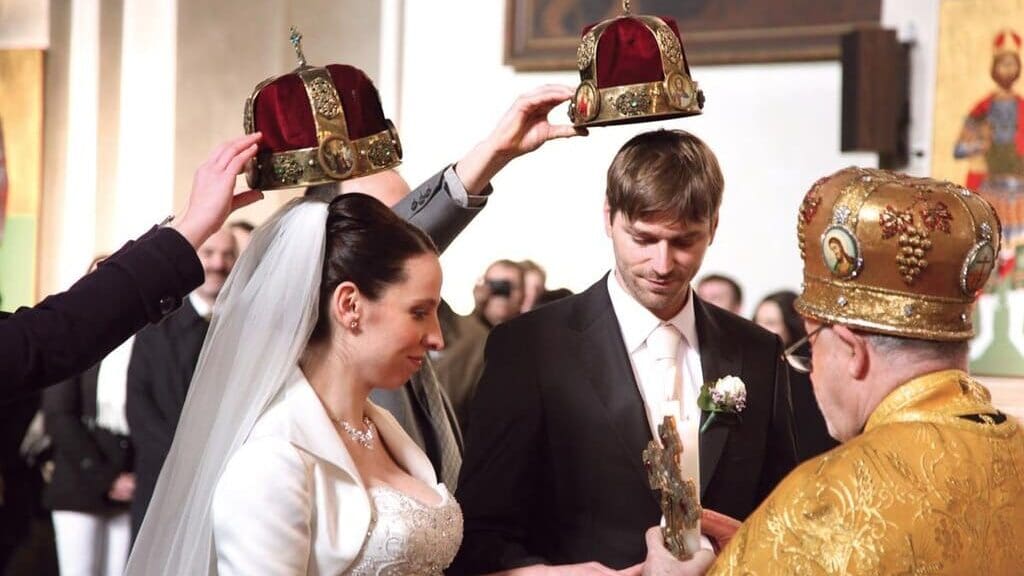
Russian Orthodox Wedding in the Church of ss. Cyril and Methodius in Prague, Czechia
Photo: VitVit, CC BY 3.0, via Wikimedia Commons
After Ukraine passed a law that could effectively outlaw the Russian Orthodox Church, lawmakers in the Czech Republic are now also examining the activities of the church.
The Senate Committee on Security has called on the government to investigate whether Orthodox churches are being used to increase Russian influence in the country, Euractiv reports. It recommends they be deregistered if any legal violations are found.
The Czech Republic allows religious bodies to register with the government and receive certain rights and funding.
The Russian Orthodox Church in the Czech Republic is affiliated with the Moscow Patriarchate, which has been accused of having close links with the Russian state. The Czech government has already sanctioned Patriarch Kirill of Moscow, head of the Russian Orthodox Church, for his public support of Russia’s invasion of Ukraine.
Earlier this month, Czech authorities expelled Russian Orthodox cleric Nikolai Lishchenko, accusing him of setting up structures to support Russian influence and interests in the EU.
Following the expulsion, Czech foreign minister Jan Lipavsky, a member of the left-wing Pirates party, declared:
I do not consider the Russian Orthodox Church of the Moscow Patriarchate to be a church and its representatives to be clergymen. It is part of the Kremlin’s repressive machine that is involved in Russia’s influence operations. And that is how they should be treated not only in the Czech Republic but throughout Europe.
The Senate Committee also wants to investigate the Orthodox Church of the Czech Lands and Slovakia (OCCLS). This is a completely separate church that yet has also faced accusations of harbouring Russian-linked individuals.
However, the OCCLS hit back at the accusations. “We strongly object to the unprecedented denigration of our church by politicians and ministerial officials and their efforts to manipulate our church into ideological obedience,” a spokesman said.
All these political efforts come despite fewer than 0.5% of Czechs identifying as Orthodox Christians in the most recent census.
The call comes after Ukraine passed a law targeting the Russian Orthodox Church. The new law does not mention any specific church, however it outlaws the activities of religious organisations “affiliated with centres of influence” in Russia.
The Ukrainian Orthodox Church-Moscow Patriarchate (UOC-MP), a self-governing church within the Russian Orthodox Church, was Ukraine’s largest Orthodox church before the 2022 Russian invasion. Following the invasion, it claimed to have cut ties with Moscow, declaring “full independence.”
However, it did not make an official request to the Russian Orthodox Church for independence, nor did it seek recognition from other Orthodox churches. Many believe that it is still under pro-Russian influence and helping to spread Russian propaganda within its parishes—a claim it denies.
A separate church, the Orthodox Church of Ukraine (OCU), was established in 2018 as completely independent from Moscow. Since 2022, more than half of Ukrainians have declared themselves to be members, leaving the UOC-MP.
Ukraine’s new law bans the activities of foreign religious organisations that are “located in a state that is recognized as having committed or is committing armed aggression against Ukraine and/or temporarily occupied a part of the territory of Ukraine.”
The UOC-MP will now likely face judicial proceedings to investigate whether it truly has severed links with Moscow. If it is found to have Russian ties, it could lose legal privileges, such as the right to open bank accounts or own property.
While Eastern Orthodox churches largely share doctrine and liturgical practices, the calendar, hierarchy of bishops, venerated saints, styles of iconography, and language vary. For the faithful, a political ban on a specific Orthodox church can disrupt their religious life, leading to the loss of their community and place of worship, a clear violation of religious freedom.
